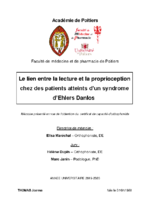Mémoire
Thomas Joanna
Le lien entre la lecture et la proprioception chez des patients atteints d’un syndrome d’Ehlers Danlos
FrançaisConsulter le texte intégral (format PDF)

Résumé
Français
Le lien entre la lecture et la proprioception chez des patients atteints d’un syndrome d’Ehlers Danlos
Introduction : Le Syndrome d’Ehlers-Danlos (SED) se traduit par une association de nombreux symptômes, dont un trouble proprioceptif, élément majeur car il est à l’origine des maladresses et des algies. Selon Jaussaud, les patients SED seraient porteurs d’un syndrome de dysproprioception SDysP, syndrome d’intégration multi-sensorielle. Les études menées par Quercia mettent en évidence un lien entre les capacités cognitives et attentionnelles, et la proprioception. Il semblerait que la mauvaise qualité des informations recueillies par le système proprioceptif demande un traitement cognitif plus couteux. Virlet et collaborateurs exposent que la réduction du SDysP en modifiant les informations proprioceptives améliore la performance cognitive comme les mécanismes d’automatisation de la lecture. Ces performances potentialisent la prise en charge orthophonique. Nous avons expérimenté l’effet des stimulations oro-faciales (STOF) orthophoniques sur les performances de lecture chez des patients SED, donc aussi SdysP. Méthodes : 24 sujets SED inclus, constituent 2 groupes de n=12 : « control » (C) ; et « stimulations oro-faciales » (S) du centre du visage vers la périphérie, sens de la fibre musculaire permettant une nouvelle distribution du tonus de la face. Le test de l’Alouette, vitesse et nombre d’erreurs, avant et après, évalue les performances de lecture. Résultats : Entre C et S aucune variation du temps de lecture n’est observée, à contrario le nombre d’erreur est réduit chez S comparativement à C (5 ; p<0.02). Discussion : La repondération sensorielle de la STOF permettrait une meilleure reconnaissance des lettres (réduction des erreurs) grâce à une meilleure intégration et discrimination, et la limitation du bruit proprioceptif erroné sans modification d’exécution du mouvement (vitesse de lecture), non influencé par la STOF. Cette dernière réduit le nombre d’erreurs, le coût cognitif et permet l’automatisation à l’accès lexical confirmant les travaux de Quercia et Virlet.
Mots-clés libres : lecture, orthophonie, proprioception, stimulation physique, Syndrome d'Ehlers-Danlos.
- Ehlers-Danlos, Syndrome d'
- Lecture -- Aspect cognitif
- Sensibilité proprioceptive
English
Introduction: Ehlers-Danlos Syndrome (EDS) results in a combination of various symptoms, including a proprioceptive disorder, a major element as it causes clumsiness and pain. According to Jaussaud, EDS patients also carry a multi-sensory integration syndrome, the dysproprioception syndrome DysPS. The studies carried out by Quercia highlight a link between cognitive and attentional capacities, and proprioception. It would seem that the poor quality of the information collected by the proprioceptive system requires more expensive cognitive processing. Virlet et al. state that reducing DysPS by modifying proprioceptive information improves cognitive performance and the mechanisms of reading automation. These performances potentiate speech therapy. We have experienced the effect of proprioceptive oro-facial stimulation (OFST) used in speech therapy on reading performance in EDS patients, therefore also DysPS. Methods: 24 EDS subjects included, constitute 2 groups of n = 12: control (C) and orofacial stimulation (S) from the center of the face to the periphery, following the sense of muscle fibers allowing a new distribution of facial tonus. The Alouette test: speed and number of errors, before and after, assesses reading performance. Results: between C and S, no variation in reading time is observed, on the contrary the number of errors is reduced in S compared to C (5; p <0.02). Discussion: The sensory reweighting of the OFST would allow better letter recognition (reduction of errors) thanks to better integration and discrimination, and the limitation of erroneous proprioceptive noise without modification of movement execution (reading speed), not influenced by OFST. The latter reduces the number of errors, the cognitive cost and allows lexical access automation confirming the work of Quercia and Virlet.
Keywords : reading, speech-therapy, proprioception, physical stimulation, Ehlers-Danlos Syndrome.
Notice
- Diplôme :
- Orthophonie 5 (2017)
- Établissement de soutenance :
- Université de Poitiers
- UFR, institut ou école :
- UFR Médecine et Pharmacie
- Domaine de recherche :
- Orthophonie
- Directeur(s) du travail :
- Elisa Maréchal
- Date de soutenance :
- 23 juin 2020
- Président du jury :
- Hélène Dupin
- Membres du jury :
- Marc Janin
Menu :
-
-
à propos d'UPétille
-
Voir aussi
Annexe :

-
Une question ?
Avec le service Ubib.fr, posez votre question par chat à un bibliothécaire dans la fenêtre ci-dessous ou par messagerie électronique 7j/7 - 24h/24h, une réponse vous sera adressée sous 48h.
Accédez au formulaire...
Université de Poitiers - 15, rue de l'Hôtel Dieu - 86034 POITIERS Cedex - France - Tél : (33) (0)5 49 45 30 00 - Fax : (33) (0)5 49 45 30 50
petille@support.univ-poitiers.fr -
Crédits et mentions légales
